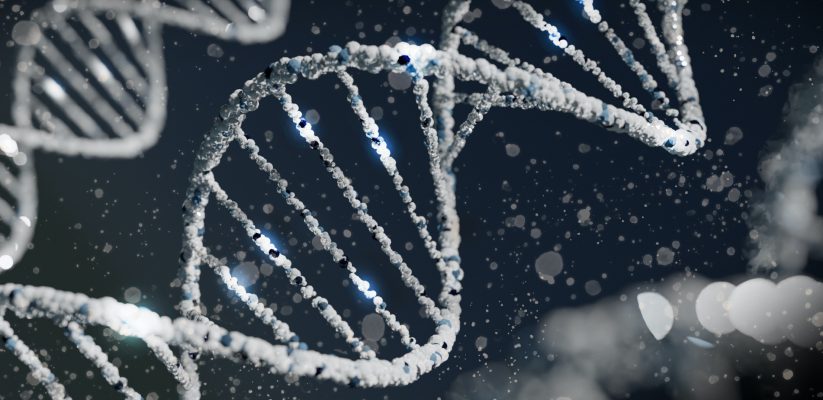Author: Dr Emanuela Volpi, School of Life Sciences, University of Westminster
Research into the genetic basis of obesity has significantly contributed to the destigmatisation of excessive weight gain over the last two decades. A few of us might still remember some of the often questionably illustrated but catchy newspapers headlines in the mid noughties (e.g. ‘Does my bum look big in these genes?’, The Scotsman, 2007) which drew public attention to the discovery of novel genetic variants associated with common obesity, such as those of the ‘fat-mass and obesity-associated’ locus or FTO, a gene that promotes food intake. The steady build-up of scientific evidence supporting the key role of genetic factors in determining individual predisposition to obesity – for instance by inhibiting or stimulating appetite – has been crucial for challenging deep-seated, highly detrimental societal stereotypes based on the misperception of excessive weight gain as being entirely a matter of individual responsibility.
It is now universally acknowledged that obesity is a multifactorial disorder caused by the complex interplay of different contributing factors; some of which are beyond our control, such as inborn genetic variants, and some of which are of an environmental kind, so partly within our control such as diet and lifestyle, but also heavily affected by social and economic circumstances. Due to its steady rise to unprecedented pandemic proportions over the last half a century and the increased public awareness of health disparities inflecting it, obesity has firmly become one of the high priority public health concerns on a global scale.
When considering the complexity of the genetics-environment interaction central to weight gain and the aetiology of obesity, progressively more researchers have been showing an interest in the bidirectionality of that interaction for the understanding of the full pathophysiology of obesity, particularly in connection with the established link with noncommunicable diseases such as diabetes, cardiovascular disease, and cancer. The association between obesity and increased risk of cancer came under intense societal scrutiny following a controversially received awareness campaign launched by CRUK in 2019. It proclaimed obesity as the ‘new smoking’. Although research evidence supporting the epidemiological connection between obesity and increased risk of cancer is extensive, the causative mechanistic aspects underpinning this association are only partially understood. One of the working hypotheses is that obesity is genotoxic. Our genetic variants dictate our predisposition towards obesity. However, like smoking does, can metabolic disturbances of obesity conversely lead to other pathological consequences such as cancer by contributing to cellular DNA damage and so affecting the structural integrity, stability, functionality, and indeed premature ageing of our genome?

The notion of genotoxicity as a key oncogenic factor in obesity is substantiated by several lines of evidence, including biomolecular aspects as well as epidemiological observations. For instance, obesity manifests with inflammation, hyperglycaemia and dyslipidaemia, a common pathological consequence of which is oxidative stress. Through the excessive generation of reactive oxygen species (ROS), oxidative stress can lead to oxidative DNA damage, a well know threat to genome integrity and stability. Indeed, a positive correlation between excess adiposity and markers of oxidative DNA damage has been reported in several studies in human participants and animal models. In addition, obesity has been associated with micro-nutritional deficiencies. The reported Vitamin D deficiency caused by obesity has attracted particular attention for the known anti-inflammatory properties and role in DNA repair of this vitamin.
Pathological implications from excess adiposity may begin early in life. Of concern, epidemiological evidence indicates obesity in childhood and adolescence to be an independent risk factor for cancer and premature mortality in adulthood. Monitoring of acquired DNA damage may become an important part of clinical investigations in the management of obesity, alongside markers of inflammation and micro nutritional deficiencies to detect early, pre-pathological changes. As DNA damage in obesity appears to be a reversible phenomenon, biomonitoring and predictive modelling of genomic instability in young patients with obesity may contribute in future to the prioritisation and severity of clinical intervention measures.
Note: More papers by Dr Emanuela Volpi and her co-authors can be read below:
DNA damage in obesity: Initiator, promoter and predictor of cancer
Author: Dr Emanuela Volpi is a Reader in the School of Life Sciences at the University of Westminster in London. Dr Volpi earned a PhD in Evolutionary Biology from the University of Rome ‘La Sapienza’. Before joining Westminster, she held research positions at Cancer Research UK, the Italian National Research Council, and the Wellcome Trust Centre for Human Genetics at the University of Oxford. Her teaching expertise in in human and medical genetics. Her current research focuses on the understanding of risks to human health in the light of genome-environment interactions.
- Obesity as a genotoxic environment - April 28, 2023
- Dalit History Month and its significance - April 20, 2023
- A professor is going to live in an underwater hotel for 100 days – here’s what it might do to his body - April 13, 2023
